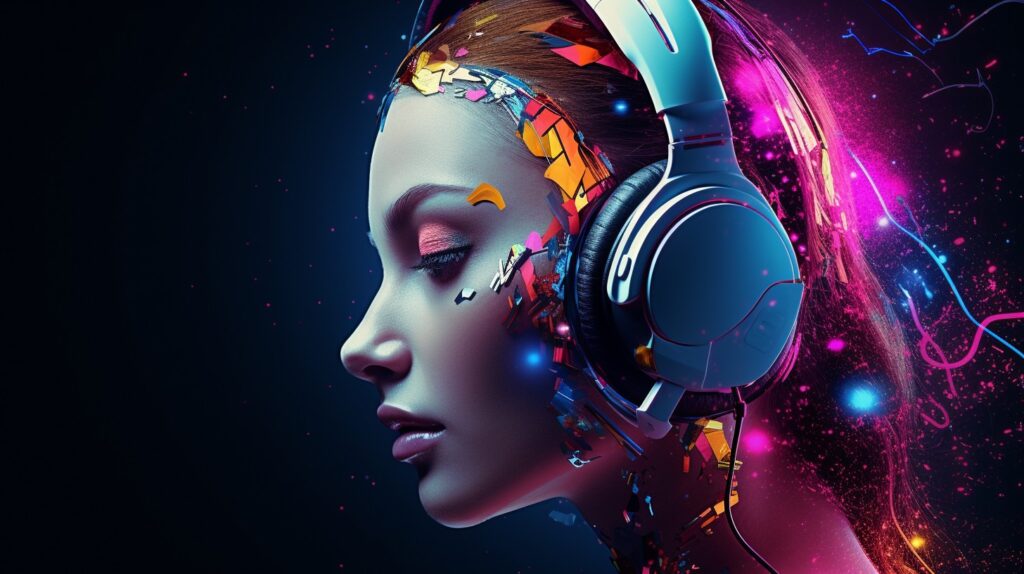The Rise Of Ai And The Impact It Could Have On The Music Industry

AI is already having a significant impact on the music industry, and its influence is only going to grow in the years to come. Here are some of the ways that AI is changing the way music is created, consumed, and discovered.
Music creation
AI-powered tools can help musicians and producers with all aspects of the music creation process, from songwriting and composition to recording and mixing. For example, AI can be used to generate new melodies and rhythms, suggest lyrics and chord progressions, and even create entire songs from scratch. AI can also be used to automate tasks such as editing and mastering, freeing up artists to focus on their creativity.
Music consumption
AI is also changing the way we consume music. Streaming services like Spotify and Apple Music use AI algorithms to recommend new music to users based on their listening habits. AI is also being used to develop personalized playlists and create immersive listening experiences. For example, some AI-powered apps can generate music that is tailored to the user’s mood or activity level.
Music discovery
AI is also making it easier for music fans to discover new music. AI-powered search engines can help users find music based on their preferences, including genre, mood, and artist. AI can also be used to recommend new music based on the user’s social media activity and location.
Here are some specific examples of how AI is being used in the music industry today:
- AI-powered songwriting tools like Amper Music and Songwriter AI can help musicians generate new melodies, lyrics, and chord progressions.
- AI-powered music production tools like LANDR and iZotope Neutron can help musicians and producers record, mix, and master their music.
- AI-powered music streaming services like Spotify and Apple Music use AI algorithms to recommend new music to users based on their listening habits.
- AI-powered music search engines like Shazam and SoundHound can help users identify songs and discover new music.
- AI-powered music discovery platforms like Pandora and Last.fm use AI algorithms to recommend new music to users based on their preferences.
Overall, AI is having a positive impact on the music industry. It is making it easier for musicians to create music, for music fans to discover new music, and for the industry as a whole to operate more efficiently. However, there are also some potential challenges that need to be addressed, such as the potential for AI to be used to create deepfakes and other forms of copyright infringement.
Overall, the rise of AI is an exciting time for the music industry. It has the potential to revolutionize the way music is created, consumed, and discovered.
The advantages of AI in music
- Enhanced creativity: AI can help musicians overcome creative blocks and explore new musical territories. For example, AI can be used to generate new melodies, harmonies, and rhythms, or to experiment with different musical styles.
- Increased efficiency and productivity: AI can automate repetitive tasks in the music production process, such as generating drum patterns or mixing and mastering tracks. This can free up musicians to focus on more creative aspects of their work.
- Personalized music experiences: AI can be used to create personalized music recommendations for listeners, based on their listening habits, preferences, and even mood. This can help listeners discover new music and enjoy a more engaging music listening experience.
- New forms of musical expression: AI is being used to create new forms of musical expression, such as interactive music experiences and AI-generated compositions. This is expanding the possibilities of what music can be and how it can be experienced.
Here are some specific examples of how AI is being used in music today:
- Music composition: AI-powered music composition tools can help musicians generate new melodies, harmonies, and rhythms. This can be helpful for musicians of all skill levels, from beginners to experienced professionals.
- Music production: AI-powered music production tools can help musicians automate repetitive tasks such as generating drum patterns, mixing, and mastering. This can save musicians time and allow them to focus on more creative aspects of their work.
- Music recommendation: AI-powered music recommendation systems are used by streaming services such as Spotify and Apple Music to suggest new music to listeners based on their listening habits. This can help listeners discover new music that they might enjoy.
- Interactive music experiences: AI is being used to create new forms of interactive music experiences, such as video games and live performances where the music can adapt to the player’s or audience’s actions and emotions.
- AI-generated compositions: AI is being used to generate entire compositions of music, from simple melodies to complex orchestral pieces. This is a new and emerging area of music creation, and it is still too early to say what the full impact of AI-generated music will be.
Overall, AI has the potential to revolutionize the music industry in many ways. By enhancing creativity, increasing efficiency and productivity, personalizing music experiences, and enabling new forms of musical expression, AI is helping musicians and listeners alike to experience music in new and exciting ways.
The challenges of AI in music
Artificial intelligence (AI) is rapidly transforming the music industry, with the potential to revolutionize music creation, distribution, and consumption. However, AI also poses a number of challenges, including:
- Loss of human creativity and artistry. AI music generators can create melodies, beats, and even lyrics, but they cannot replace the creativity and artistic expression of human musicians. Some critics argue that AI-generated music is often formulaic and lacks the emotional depth of human-created music.
- Copyright and ownership issues. As AI music generators become more sophisticated, it will become increasingly difficult to determine who owns the copyright to AI-generated music. This is especially true if AI music is based on existing copyright-protected compositions.
- Disruption of the music industry. The widespread adoption of AI music generators could disrupt traditional models of music creation and distribution. For example, AI music generators could be used to create personalized playlists or soundtracks for individual users, reducing the need for traditional record labels and streaming services.
- Lack of transparency and accountability. AI music generators are often complex and opaque, making it difficult to understand how they work and to identify potential biases. This lack of transparency and accountability could lead to ethical concerns, such as the creation of AI music that is harmful or discriminatory.
In addition to these challenges, it is also important to consider the potential social and cultural implications of AI in music. For example, some critics worry that AI could lead to a homogenization of music and a loss of diversity. Others worry that AI could be used to create music that is manipulative or addictive.
Despite these challenges, AI also has the potential to bring many benefits to the music industry. For example, AI can be used to help musicians discover new sounds and create new genres of music. AI can also be used to make music more accessible to people with disabilities and to create personalized music experiences for individual users.
Overall, the challenges of AI in music are complex and multifaceted. It is important to be aware of these challenges as AI technology continues to evolve. However, it is also important to be optimistic about the potential benefits of AI for the music industry and for music lovers around the world.
In Conclusion:
AI has the potential to revolutionize the music industry in countless ways. From generating new compositions to enhancing accessibility, the possibilities are endless. However, it is crucial to approach these advancements with caution and ensure that ethical considerations are at the forefront. As AI continues to evolve, it is important for musicians, producers, and listeners alike to stay informed and engaged in the ongoing dialogue surrounding its use in music. By doing so, we can harness the power of AI to unlock new creative possibilities and shape the future of music for generations to come.







